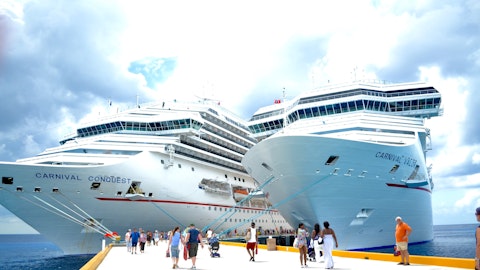Josh Weinstein: Okay. Well, so from a strategic perspective and a portfolio of brands, it assumes and we’re marching forward with the same brands that are in our current portfolio. We have taken action to reallocate our assets within our portfolio and the makeup such that, I don’t have it in front of me, but Carnival Cruise Line over this period will be about a third of our capacity. And in the timeline that I was talking about, if you look back in our pre-pause last four year period, they were closer to what was it 26%, 27% Beth? Yes, about 27%. Pardon me?
Beth Roberts: 25%.
Josh Weinstein: 25%. So, you’re looking at our highest returning brand being a third of our business up from a quarter, which is certainly part of our strategy. At the same time, our focus is generating incremental and accelerated demand for all of our brands. And I think you see that in the booking numbers that we’ve been talking about, the pace at which we’ve really been coming back, every single quarter and we expect performance to continue. So, from a strategic perspective, it’s letting the brands focus on their commercial operations, ensure they got the capability and the capacity to do everything that we expect and fill their ships with folks who are very willing to pay for the amazing experiences that they give. And I think that’s starting to really shine through.
We do have some wind in our backs as well with respect to our land based portfolio because Grand port is not currently in our portfolio, even though we’ve got an amazing footprint in an unparalleled footprint in the Caribbean, that alone will take our annual number of guests that we carry from about 5.5 million this year to 7.5 million and we expect that will be a very nice pick-up in our business.
Dan Politzer: Got it. And then just turning to the pricing gap, you and your peers have talked about relative to land based vacations. To the extent that there is some uncertainties certainly on the consumer side still and these prices have elevated considerably on the land based side. How do you think about your cushion here? And to the extent that we were to see a slowdown in lodging in RevPAR, how do you think about that as impacting your pricing stability or resilience?
Josh Weinstein: Sure. Well, obviously, based on what we’ve been telling you today, we don’t see a slowdown, which is very good, especially because one of the benefits we have is, we are very well booked for the next 12 months and those bookings are sticky. So that is incredibly helpful to our outlook. Now, what I call it, I actually call it an outrageous and ridiculous value gap to land. And that is a double-edged sword in our favor, because if there is a slowdown and if hotels take their rates down a bit and airlines take their rates down a bit and resorts, whatever that might be, we are still outsized in our value. And as a result, if there is a recession, we stick out for the right reasons because of how far your holiday dollars can go.
And on top of that, because of our home porting strategy with about 75% of our ship’s position where our guests don’t have to get on a flight should they choose not to, that sets us up very, very well for people who are trying to figure out how to stretch their vacation dollars. So, to be honest with you, our focus on base loading for 2024 and pulling ahead with all of those factors at our back, we feel quite good. And we probably said this in other calls. Every recession is different. This one happens to be one where there’s record unemployment, people still wanting to purchase experiences, particularly travel, which bodes quite well for us. We’ve got time for one more question.





